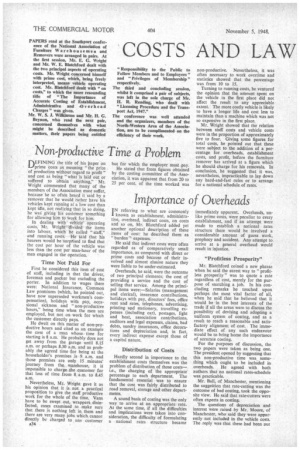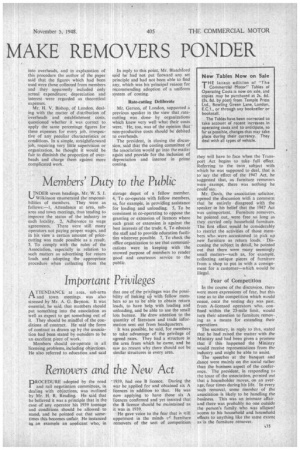Importance of Overheads
Page 52

Page 53

If you've noticed an error in this article please click here to report it so we can fix it.
I N referring to what are commonly known as establishment, administrative, overhead, indirect costs, on costs and so on, Mr. Blatchford added yet another optional description of these items of cost: he described them as " burden " expenses.
He said that indirect costs were often regarded as of comparatively small importance, as compared with direct or prime costs and because of their involved and almost elusive nature they were liable to be under-estimated.
Overheads, he said, were the outcome of two principal elements; the cost of providing a service and the cost of selling that service. Among the principal items were:—Salaries (management and clerical), insurance contributions, holidays with pay, directors' fees, office rent and rates, telephones, advertising, printing and stationery, travelling expenses (including car), postages, light and heat, association contributions, auditors and legal expenses, claims, bad debts, sundry insurances, office decorations and depreciation and, in fact, every indirect expense except those of
a capital nature.
Distribution of Costs
Hardly second in importance to the establishment costs themselves was the problem of distribution of those costs— Le., the charging of the appropriate percentage to each department. The fundamental essential was to ensure that the cost was fairly distributed to road removal, storage and other departments.
A sound basis of costing was the only way to arrive at an appropriate rate. At the same time, if all the difficulties and implications were taken into consideration, the difficulty of formulating a national rates structure became
immediately apparent. Overheads, unlike prime costs, were peculiar to every establishment, and if an attempt were made to establish a national rates structure there would be involved a considerable amount of guess work, prophecy and accident. Any attempt to. arrive at a general overhead would result in injustice.
"Profitless Prosperity"
Mr. Blatchforil coined a new phrase when he said the surest way to "profitless prosperity" was to quote a rate regardless of cost, merely for the purpose of snatching a job. In his concluding remarks he touched upon perhaps the most vital factor of all, when he said that he believed that it would be • in the best interests of the trade if all the areas were to discuss the possibility of devising and adopting a uniform system of costing, and as a result to reach a reasonable and satisfactory alignment of cost. The immediate effect of any such endeavour would be to bring home the importance of accurate costing.
For the purposes of discussion, the two papers were taken as being one. The president opened by suggesting that this non-productive time was something which ought to be included in overheads. He agreed with both authors that no national rates-schedule was practicable.
Mr. Ball, of Manchester, mentioning the suggekion that rate-cutting was the outcome of bad costing, took the opposite view. He said that rate-cutters were often experts in costing.
The questions of depreciation and interest were raised by Mr. Moore, of Manchester, who said they were apparently not included in the vehicle costs. The reply was that these had been put into overheads, and in explanation of this procedure the author of the paper said that the figures which had been used were those collected from members and they apparently included only actual expenditure; depreciation and interest were regarded as theoretical expenses.
Mr. H. V. Bishop, of London, dealing with the matter of distribution of overheads and establishment costs, questioned whether it was correct to apply the same percentage figures for these expenses for every job, irrespective of any peculiar characteristics or conditions. In a simple, straightforward job, requiring very little supervision or organization, he thought it would be fair to diminish the proportion of overheads and charge them against more complicated work. In reply to this point, Mr. Blatchford said he had not put forward any set principle and had not been able to find any, which was his principal reason for recommending adoption of a uniform system of costing.
Rate-cutting Deliberate Mr. Gerson, of London, supported a previous speaker in the view that ratecutting was done by organizations which knew very well what their costs were. He, too, was of the opinion that non-productive costs should be debited to overheads.
The president, in closing the discussion, said that the costing committee of the association would go into the matter again and provide for the inclusion of depreciation and interest in prime costing.




















































































